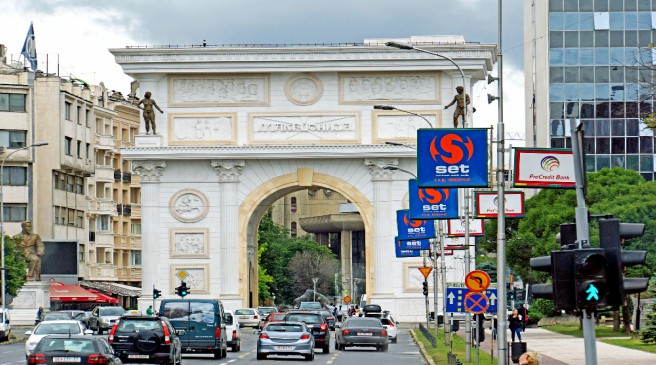
Landlocked on the Balkan Peninsula, Macedonia is a beautiful land with a rich history. Like the rest of the region, the different ethnic groups of Macedonia have deep animosity toward each other. On Thursday, the country plunged even further into crisis as violence erupted in the parliament.
When my family lived in the former Yugoslav Republic of Macedonia from 2008-2011, we were welcomed with kindness yet also felt a palpable tension. Macedonia is a small country that, in my experience, most Americans know little about. We can learn from this small Balkan state and its years of turmoil.
What’s Going on in Macedonia
Since a major wiretapping scandal was revealed in 2015, Macedonia has not had a functioning government. Elections were held last December, but failed to institute a new government. In any country, this is devastating. For Macedonia, one of Europe’s poorest countries, it could be the end of the country as we know it.
On Thursday the parliament tried to elect a new speaker, and 200 protestors stormed through a police cordon, injuring about 100 people, including police officers and lawmakers. The issue with the new speaker-elect? He’s Albanian.
Many of Macedonia’s political issues stem from the conflict within the country’s biggest ethnic groups. About two-thirds of the country identify as Macedonians, or ethnic Slavs, and are largely Orthodox. About a fourth of the population identifies as Albanian, who are almost all Muslim. Neighborhoods are known for which ethnicity lives in Skopje, the country’s capital. While the Albanians know Macedonian, they speak Albanian as their first language. Political tension is rooted deep within the identities of the people as ethnicity, in addition to ideology, divides parties.
When Yugoslavia fell in 1991, Macedonia was the only new country established from its former domain without a civil war. The war in bordering Kosovo sent 200,000 Albanian refugees to Macedonia, almost doubling the Albanian population there. Ethnic tension built until 2001, when Albanian insurgents attacked villages and cities near the country’s northern border. From February to August, terror reigned. Seventy lives were taken and countless more lost their homes and everything they owned.
The Ohrid Framework Agreement, signed in August 2001, ended the insurgency after six months. One of the most significant points of the deal was establishing Macedonian as the country’s official language while allowing for any language spoken by at least 20 percent of the population in any municipality to also be an official language for that local government. The insurgents also received amnesty. Ethnic Macedonians still consider this a huge defeat.
The Agreement Hasn’t Stopped the Violence
Although the insurgency ended without a civil war, the Macedonians and Albanians have not found peace and harmony with each other. Fights and violent crimes fueled by prejudice have continued to hurt the country. As if the wiretapping operation in 2015 wasn’t enough to harm citizens’ opinion of their government, the president offered a pardon to the dozens implicated. Anti-government riots afterwards caused significant destruction.
When the elections came around in late 2016, VMRO-DPMNE, the ruling party, had the most votes, but not enough to win. They failed to ally themselves with smaller parties, while the opposing SDSM party allied with ethnic Albanian parties to end up with a majority and a win. Yet the VMRO-DPMNE has refused to let the SDSM union establish the new government, saying the Albanians threaten national security. When the vote for the new parliament speaker elected an Albanian, nationalists stormed the building.
Hate dominates Macedonia’s attitude about fellow countrymen, affecting everything from government to neighborhood soccer teams. Martin Luther King Jr. observed that “returning hate for hate multiplies hate.” Macedonia has shown this to be true. They live in a cycle of hateful action from one ethnic group against the other.
What Americans Can Learn from Macedonia’s Woes
Macedonia isn’t the only country that allows crimes of hate against their own. The United States has a terrible history of oppressing people. We have to see the harm it does to everyone involved. As hate seeks to destroy the object of its enmity, it also destroys the person who possesses the hate.
We have to lead young generations to respond civilly to ideas and people with whom we don’t agree. On this—and I can’t believe I’m saying this—Bernie Sanders recently got it right by supporting Ann Coulter’s free speech rights in the face of University of California-Berkeley protesters. Intimidation, threats, and violence are harmful to everyone. We’re a diverse people, and we’re not going to always agree, but we have to see the humanity of every person and find a different way to communicate our disagreements. We don’t want to determine our leaders and policies through the lens of hatred.
Even though the political tension during our 2016 election cycle was elevated to more significant heights than I remember in my lifetime, the election came and went, and a new president sits in office. This is a blessing that many countries in the world don’t have. Whether you like our new president or not, we should be thankful to live in a country where we have an election process. In four years, we’ll do it again.
As I hear about civil unrest in America, I can’t help but wonder: is Macedonia’s present our future? Could we end up a country whose elections cycles don’t determine our leaders? Will violence be a part of establishing our government?
A friend reported that on Friday life continued as normal for most of Skopje, but I fear danger for the people and their country. I hope they can peacefully establish a government and will find a way to live in harmony. But I also hope that my fellow Americans will heed the warning coming from Macedonia of what happens when people focus on identity and use violence to snatch power rather than seeking to solve conflicts peacefully through free speech under the rule of law.
By:Jessica Burke
Source: The Federalist